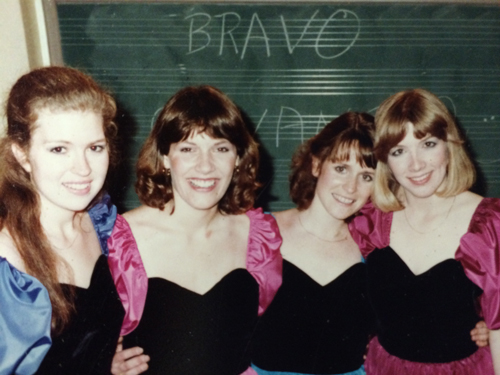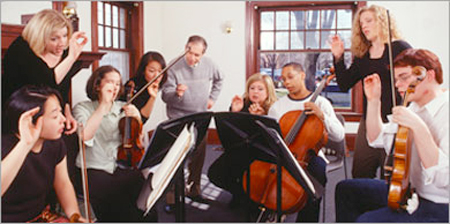by Carlyn Kessler and Mike Telin
The Cavani’s Intensive Quartet Seminar is renowned for preparing well-rounded musicians. The program allows students to constructively track their progress alongside their peers, who, just like faculty members, are valuable resources. The IQS is an incubator for creative ideas, and a “safe place” for improvement, empathy and inspiration. We spoke to current IQS students and alums and asked them about the program’s impact on their education and careers.
“Working with the Cavani Quartet as part of the Intensive Quartet Seminar and Apprentice Quartet Program completely transformed how I thought about music and its relationship to the world,” violist Elizabeth Oaks said in a recent e-mail. “I learned that I could strive to perform the repertoire I loved at the highest possible level while working to bring music to a diverse range of audiences in a creative way.”
Oaks, who earned her master’s degree at CIM in 1991, went on to say, “I cannot overstate how important their teaching was for me. It became the backbone of my twenty-two year career with the Maia Quartet, and is now the cornerstone of my String Quartet Residency Program at the University of Iowa. The Cavani Quartet is unparalleled in their ability to communicate the joy and passion of making music to audience.”

The original Cavani Quartet at their inaugural concert.
Cellist Alex Cox earned his bachelor’s from CIM in 2013 and he agrees with Oaks that being part of IQS was a life-changing experience. “Whenever I mention that I went to CIM, I’m always asked if I enjoyed the school’s chamber music program. My answer is always the same, it changed my life and sent me on a path in music I never expected.” Cox, who is currently a master’s candidate at Juilliard went on to say, “The IQS not only instilled a standard of excellence in performing, but it also taught relationship building within groups, which is perhaps one of its most special qualities.”
There’s no doubt that the training students receive as IQS participants is second to none, but what do the participants do each week in quartet boot camp? Current student, Nina Sandberg, violin, who along with violinist Dylan Kennedy, violist Christianna Bates, and cellist David Olson formed the Zeitlin Quartet as freshmen, provided more details about the program.
“There are six quartets in the IQS, and each semester there is a theme. This semester is all Beethoven, but different periods of Beethoven. And because all six groups meet together, you’re not only studying your piece, but all the others as well.” Each quartet is allotted 20 minutes during each session. Sandberg said the sessions are always fun. The participants learn how to interact with each other, and how to make constructive criticism.
Sandberg pointed out that the sessions are about more than just the music itself. “Each seminar, one group member speaks for about three minutes before the quartet performs their selected movement, and everyone in the group gets a chance to do this over the course of the semester. They talk about the historical background of the piece, or something interesting that was happening in the world at the time, which puts it into context. They also talk about specific attributes of the movement, like its form and what makes it interesting. Finally, they discuss what the group has been working on that week, which I think is the most helpful. Then the coaches and audience can see what you’ve accomplished and what you can do to further your goal.”
Violinist Rachel Shapiro of the Aeolus Quartet, formed at CIM in 2008, feels that they owe the Cavani a great deal, especially when it comes to developing community outreach activities. “They told us that the ability to engage with audiences of all kinds is essential to success. They helped us put together our first outreach program for elementary school students. I remember how nervous we were performing it. I also remember thinking, ‘is this really necessary? I thought I came here to practice scales and play concerti.’ But there we were, acting out skits. However, that training has been very important for us as a professional string quartet. Nearly every concert engagement we have comes with an outreach performance or two — that is just expected. We love reaching out to people that way. We take outreach seriously, and we were the Fischoff Educators of the Year in 2013. We are quite proud of that. And we have to credit our start to the Cavani.”
CIM student Sarah Toy, viola, a member of the Commodore Quartet along with violinists Elizabeth Furuta and Maria Park and cellist Hannah Moses, said: “Simply put, I wanted to participate in IQS because I love chamber music. I feel that the strength of CIM’s string and chamber music program sets it apart from other music programs. And being in IQS has been a great way to get as much out of my time at CIM as possible.”
In his nomination of the Cavani Quartet for a Chamber Music America Acclaim Award, CIM president Joel Smirnoff wrote, “As a member of the Juilliard Quartet, I originally had the pleasure of meeting and hearing the Cavani at a String Quartet Congress in Washington, D.C. years ago. After that, the Juilliard Quartet visited the Cleveland Institute of Music numerous times to perform, give master classes and coach students. In this context, I had the opportunity to observe the Cavani’s musicianship and professionalism and became aware of their boundless energy and enthusiasm of sharing chamber music with people of all ages and in a variety of locations. Now, as president at CIM, I am extremely proud to have a quartet of Cavani’s caliber in residence at the school. They enhance the education of our students, give them great exposure to great music, and teach them vital skills in presentation and communication.”
Published on ClevelandClassical.com March 2, 2015.
Click here for a printable copy of this article




